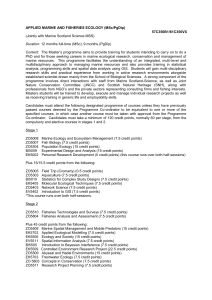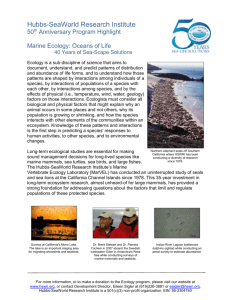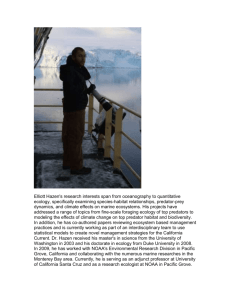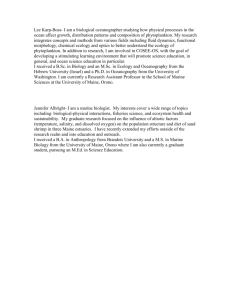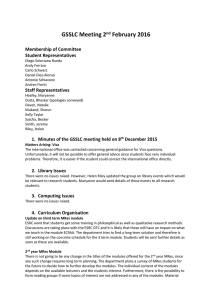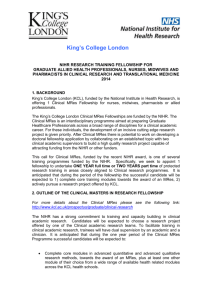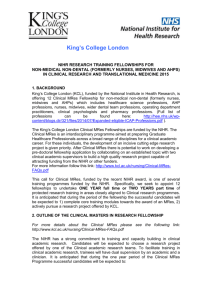Degree of Master of Research in Applied Marine and Fisheries
advertisement
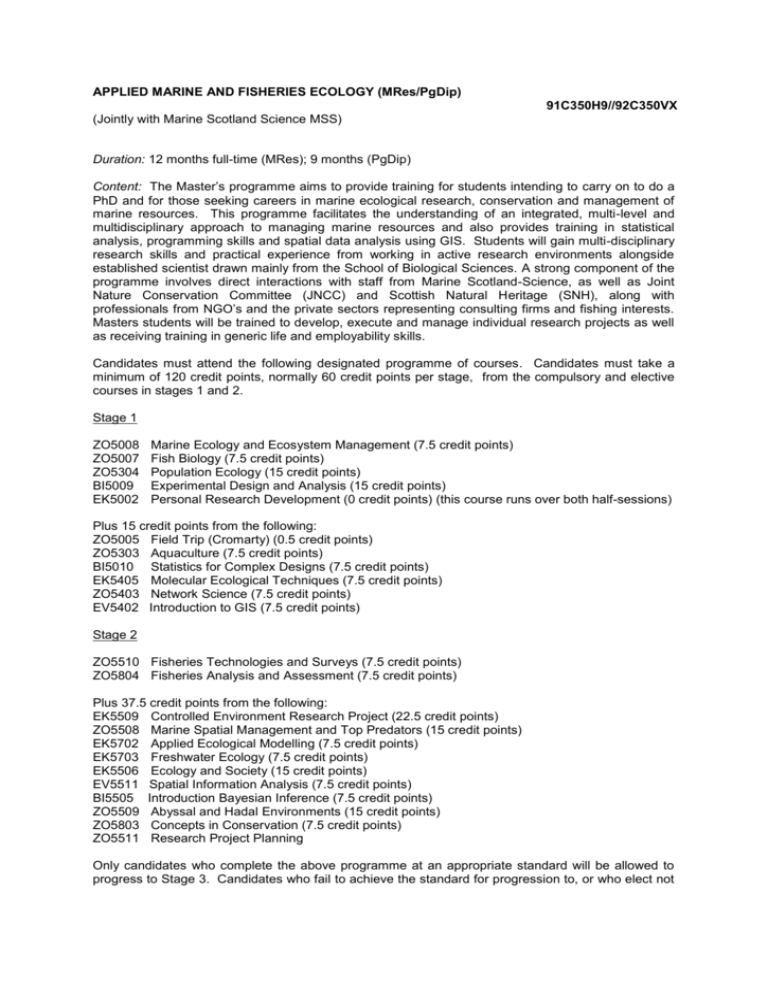
APPLIED MARINE AND FISHERIES ECOLOGY (MRes/PgDip) 91C350H9//92C350VX (Jointly with Marine Scotland Science MSS) Duration: 12 months full-time (MRes); 9 months (PgDip) Content: The Master’s programme aims to provide training for students intending to carry on to do a PhD and for those seeking careers in marine ecological research, conservation and management of marine resources. This programme facilitates the understanding of an integrated, multi-level and multidisciplinary approach to managing marine resources and also provides training in statistical analysis, programming skills and spatial data analysis using GIS. Students will gain multi-disciplinary research skills and practical experience from working in active research environments alongside established scientist drawn mainly from the School of Biological Sciences. A strong component of the programme involves direct interactions with staff from Marine Scotland-Science, as well as Joint Nature Conservation Committee (JNCC) and Scottish Natural Heritage (SNH), along with professionals from NGO’s and the private sectors representing consulting firms and fishing interests. Masters students will be trained to develop, execute and manage individual research projects as well as receiving training in generic life and employability skills. Candidates must attend the following designated programme of courses. Candidates must take a minimum of 120 credit points, normally 60 credit points per stage, from the compulsory and elective courses in stages 1 and 2. Stage 1 ZO5008 ZO5007 ZO5304 BI5009 EK5002 Marine Ecology and Ecosystem Management (7.5 credit points) Fish Biology (7.5 credit points) Population Ecology (15 credit points) Experimental Design and Analysis (15 credit points) Personal Research Development (0 credit points) (this course runs over both half-sessions) Plus 15 credit points from the following: ZO5005 Field Trip (Cromarty) (0.5 credit points) ZO5303 Aquaculture (7.5 credit points) BI5010 Statistics for Complex Designs (7.5 credit points) EK5405 Molecular Ecological Techniques (7.5 credit points) ZO5403 Network Science (7.5 credit points) EV5402 Introduction to GIS (7.5 credit points) Stage 2 ZO5510 Fisheries Technologies and Surveys (7.5 credit points) ZO5804 Fisheries Analysis and Assessment (7.5 credit points) Plus 37.5 credit points from the following: EK5509 Controlled Environment Research Project (22.5 credit points) ZO5508 Marine Spatial Management and Top Predators (15 credit points) EK5702 Applied Ecological Modelling (7.5 credit points) EK5703 Freshwater Ecology (7.5 credit points) EK5506 Ecology and Society (15 credit points) EV5511 Spatial Information Analysis (7.5 credit points) BI5505 Introduction Bayesian Inference (7.5 credit points) ZO5509 Abyssal and Hadal Environments (15 credit points) ZO5803 Concepts in Conservation (7.5 credit points) ZO5511 Research Project Planning Only candidates who complete the above programme at an appropriate standard will be allowed to progress to Stage 3. Candidates who fail to achieve the standard for progression to, or who elect not to proceed to, the final stage shall be awarded a Postgraduate Diploma if they have achieved the appropriate number of credits for that award. Stage 3 ZO 5902 Research Project/Dissertation (60 credit points) Assessment: By a combination of (1) written assignments, reports and presentations as prescribed for each course, (2) a dissertation (submitted in an agreed manuscript format) covering the research project. Both MRes and Diploma candidates are usually required to attend an oral examination. The degree of MRes shall not be awarded to a candidate who fails to achieve a CGS grade of D3 or above in the MRes project.
